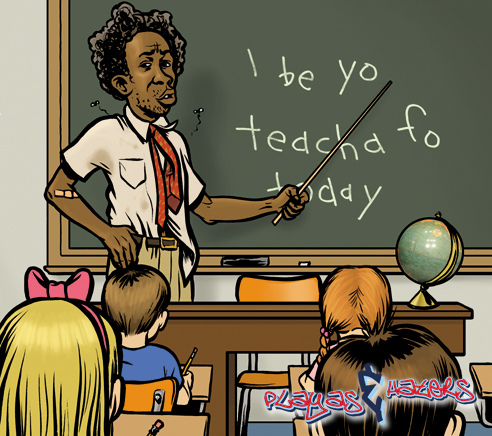Zora
Neale Hurston uses a different style of dialogue, compared to other stories,
within this novel. Each character has a unique “voice” whenever they are
talking or discussing with one another. They all contain the “Southern Black
slang” form of speech, also most commonly known as “ebonics”. This is
considered one of the most interesting aspects of “Their Eyes Were Watching
God”. Hurston’s use of transitioning from her Standard Written English to early
century Southern black dialect provides a clearer understanding of the
characters. The extended passages of dialogue portray the language of Southern
blacks, presenting a type of authentic voice that is not often used or seen in
other forms of literature. In addition to asserting the existence and abundance
of Southern black culture, Hurston’s use of dialogue articulates particular
concerns within the novel.
Towards
the beginning of this novel, for example, a group of woman were discussing the
appearance of Janie. Their dialogue with one another portrays the relationship
they have with each other. Constant questions such as “Where all dat money her
husband took and died and left her?”(Hurston 2) or “Where she left dat young
lad of a boy she went off here wid?” (Hurston 2) were being asked within their
conversations. During this specific part of the novel, a clear example of
Southern Black speech is presented which also allows the story as well as the
characters seem somewhat “real”. The use of this dialect makes the characters
seem real; they are believable and not only that but the audience is also drawn
into the action of the story. As the story progresses, this form of speech
continues to be presented.
The
picture depicts how Ebonics is commonly used by the African American race.
Hurston uses this form of dialogue to bring the characters to life and allow
the audience to gain a clearer example of specific events within the novel.

I agree on how the use of Hurston's style of dialogue makes the characters seem "real". The text makes the reader feel as though you're right there in the moment with the characters having a conversation. The reader just wants to keep reading because the dialogue makes the story more interesting.
ReplyDeleteHurston's use of dialogue provides the characters with a distinct voice. You made a valid point in that the Southern Black dialect makes the characters appear real; the reader has the ability to feel as though they were in the novel itself as Darah stated above. Also, you provided a relevant example from the text of the women discussing Janie's return to the town. Along with the text reference, you contributed an applicable picture portraying Ebonics. From the picture we can assume he is most likely from the South where similar slang is utilized.
ReplyDeleteBrilliant synopsis Kyle! There is truth in what you said about Hurston's use of diction in order to specify the innate quality of the ebonics that the characters use. In doing so, Hurston not only makes it clear to the reader the nature of the story, but also that the setting and time period of the story are equally important as well. I liked your text examples which came when the women in the community where criticizing Janie in the beginning of the story, and this is because it shows Hurston's ability to think of possible view points for different characters in the story. The picture at the end of your comment ties in what everything you said nicely as well because it is a realistic dipiction of ebonics spoken in reality and not just in the context of a story.
ReplyDelete